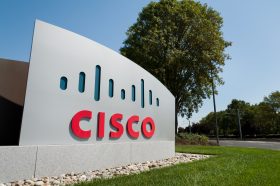Why Cisco is in Existential Crisis

(Warning: This column is very opinionated.)
The Cisco apologists are out defending the company's Q4 2020 results, announced Wednesday afternoon, which appear to be reflecting a looming existential crisis. As Cisco CEO Chuck Robbins indicated in his somber presentation, it's time for the company to do some soul-searching.
For all the gory details of Cisco's fourth quarter, you can read a summary on MarketWatch. Let's highlight scariest points: The company's revenue fell 9% to $12.15 billion from $13.4 billion in the year-ago period and earnings per share shrunk to 80 cents a share, down slightly from 83 cents a share a year ago. Chief Executive Officer Chuck Robbins said Cisco plans a large restructuring in which it aims to reduce expenses by $1 billion over the next few quarters.
More importantly, the share price plunged more than 10% this week in response to the earnings.
(For free analysis of Cisco and other networking, security, and cloud companies, make sure you subscribe to the Futuriom newsletter here.)
Existential Crisis Looms
The Cisco cheerleaders like to point out that the company's share of software revenue is increasing -- but is that because software is growing fast or because hardware is shrinking? Cisco's Infrastructure Platforms group was down 16% and Applications was down 9%.
My take: The company is now in existential crisis. What kind of company is Cisco? On the marketing side, the company likes to tout its move into software and cloud, but in the numbers there is little to show for it. The M&A strategy has been all over the map: From integrated optics to silicon and business analytics and security software. Meanwhile, the company has been shrinking, revenue wise, for years.
In cloud software and security, high fliers such as Crowdstrike (CRWD), Twilio (TWLO) and Datadog (DDOG), had recent IPOs and have share prices and growth that make them look like rocket ships. On the traditional enterprise networking front, Cisco is losing market share to Arista Networks.
Cisco Is Losing to the Cloud
Then there's the gigantic elephant in the room: Cloud infrastructure players such as Amazon (AMZN), Microsoft (MSFT), and even data-center hosting companies such as Equinix (EQIX) are building out networks as well as software that they offer as-a-service, becoming Cisco competitors. They are building these networks without Cisco's help. Where does that leave Cisco's core market? It's all going to the cloud.
How'd this all happen? The central problem is that Cisco has sacrificed innovation in recent years for preserving cash and dividends for its conservative investor base. This approach has taken a toll on the company's long-term viability. The company talks about innovation and bold technical visions -- but basically it is run by the sales guys and beancounters.
[Publisher's note: Support independent analysis! Consider subscribing to our premium reports on important markets and trends, including Cloud Capex Trends, 5G Cloud Edge, SD-WAN, and more! $895 per subscriber annually gets you all of the reports!]
M&A Record: Where's the Growth?
Cisco has tried to grow with acquisition but its track record in is mixed. A couple of its older acquisitions, $7B for Scientific Atlanta in 2006 and $600M for Flip Video in 2009, now seem kind of bizarre: A cable box company and a consumer video camera business? They turned into distant memories.
Cisco bought Webex in 2007 for a couple billion, and that's still around -- but it's no Zoom (ZM). Cisco doesn't seem to have put much investment or improvement into Webex. Next to Zoom, or even Microsoft's Teams, Webex is painful to use and feels dated and overly corporate.
But those deals were all during the John Chambers era. What about Chuck, who took over in 2015? Just recently Cisco bought ThousandEyes, a networking analytics company, for about $1B. That could still play out. Last year it made one of its biggest deals with the acquisition of Acacia Communications for $2.6 billion. Acacia is an optics company. 2017 was a big year with the acquisition of application performance firm App Dynamics ($3.7B) and SD-WAN company Viptela ($600M). Cisco has fierce competitors in the SD-WAN area including VMware, Silver Peak (which is being acquired by HPE), and Versa Networks -- among many others.
The list goes on and on. Let's see if you can remember these or can quantify an impact: Singularity Networks (2019), July Systems (2018), Duo Security (2018), Skyport Systems (2018)? Whoa.
If I could summarize: How do you pay billions of dollars for that many companies and still shrink?
What Cisco Insiders Say
Yesterday I spoke or texted with about four or five other Cisco "insiders." One well-informed person told me that Cisco has missed huge opportunities in the cloud, including in Kubernetes and edge compute. Yet another pointed out that Cisco has been pushing out key technical leaders that have left for faster growing companies such as Arista or startups.
Another former Cisco executive pointed out that the fiscal fourth quarter is usually Cisco's "sandbaggging" quarter in which it sets the table for beating expectations -- so if it missed, things must bereally bad.
Chuck Robbins seems like a good guy and his leadership has been steady, if uninspiring (I've never been granted an interview with Robbins, so I don't know him well). In the quarterly earnings call he promised to steer the ship in a new direction, favoring re-investment in R&D. This has many risks. First, many of Cisco's core shareholders are now dividend-seeking value investors, and more R&D might scare investors away. Second: Cisco has never been a great R&D company.
Some Questions for Cisco to Answer
All this leaves myself -- as well as investors -- with many questions. As Cisco attempts to right the ship, here are some of the questions and things Cisco investors and leaders really need to think about:
- What is the core company strategy and vision? Cisco claims it is becoming a software company, but its largest recent strategic moves -- buying optical company Acacia and announcing it will disaggregate its own chips and sell them as a product known as Silicon One, look like they are designed to shore up its hardware business. Which is it?
- How does it get cloudier? All the best tech companies right now have been executing well in cloud software. Cisco has missed enormous moves in cloud infrastructure software. Whether it's Kubernetes management and applications, containerization, or cloud security -- Cisco is not seen as a leader. It has a big war chest to make bets. Will it make the right ones? So far it's missed some big ones.
- Is it time to put more engineers in charge? Cisco's top managers tend to be marketing and sales people. When you have a conversation with a Cisco person, it usually sounds like an advertisement, rather than a intellectual technical discussion. If Cisco is serious about being big in R&D, it needs to roll out more big-brained technical visionaries and fewer vaporware presentations.
If you don't believe that Cisco has an existential strategy crisis, check out the apparent two following quotes from Robbins, from the Cisco earnings transcript:
"At the same time, we're going to rebalance our R&D investments to focus on key areas that will position us well for the future. More specifically, we will accelerate the transition of the majority of our portfolio to be delivered as a service. We will also accelerate our investments in the following areas: cloud security; cloud collaboration; key enhancements for education, healthcare, and other industries; increased automation in the enterprise; the future of work; and application insights and analytics.
And then, Robbins immediately said:
"At the same time, we will continue our focus in the following areas, many of which have been accelerated by the pandemic: multi-cloud investment; 5G and Wi-Fi 6; 400-gig; optical networking; next-generation silicon; AI; and more. These investments will help define the next phase of our transformation and allow us to bring the best, most relevant innovation to our customers in simpler, more easily consumables ways."
In just two paragraphs, Robbins said that Cisco is going to focus on as-a-service software, multi-cloud, wireless, high-end optics, networking silicon, and AI.
Holy machine-learning, Batman, that's a lot of things to focus on!
This conflict is at the heart of Cisco's challenges. Can it really continue to focus on being a leader in vertically integrated hardware solutions at the same time that it can be a major player in cloud and security software?
It seems like the company would do best to pick one, or just a few. And pile on there.
(Disclosure: As a research firm, Futuriom has more than 20 clients in the networking and cloud infrastructure space, many of whom are competitors with Cisco. )
Futuriom research and analysis is supported in part by Cloud Tracker Pro, our premium subscription product. See our detailed reports on important markets and trends, including Cloud Capex Trends, 5G Cloud Edge, SD-WAN, and more!





















